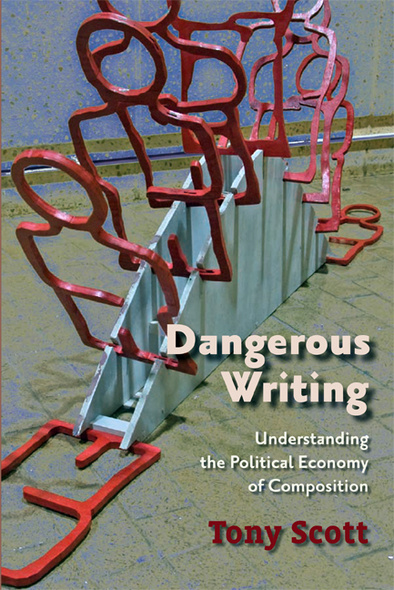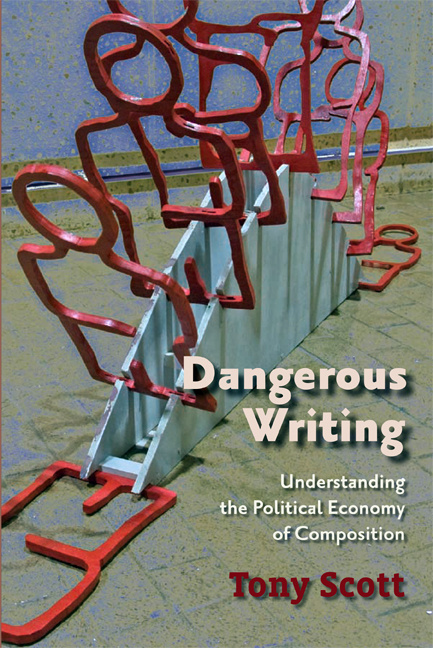Our shopping cart is currently down. To place an order, please contact our distributor, UTP Distribution, directly at utpbooks@utpress.utoronto.ca.
Dangerous Writing
Understanding the Political Economy of Composition
By Tony Scott
Utah State University Press
Building on recent work in rhetoric and composition that takes an historical materialist approach, Dangerous Writing outlines a political economic theory of composition. The book connects pedagogical practices in writing classes to their broader political economic contexts, and argues that the analytical power of students’ writing is prevented from reaching its potential by pressures within the academy and without, that tend to wed higher education with the aims and logics of “fast-capitalism.”
Since the 1980s and the “social turn” in composition studies and other disciplines, scholars in this field have conceived writing in college as explicitly embedded in socio-rhetorical situations beyond the classroom. From this conviction develops a commitment to teach writing with an emphasis on analyzing the social and political dimensions of rhetoric.
Ironically, though a leftist himself, Tony Scott’s analysis finds the academic left complicit with the forces in American culture that tend, in his view, to compromise education. By focusing on the structures of labor and of institutions that enforce those structures, Scott finds teachers and administrators are too easily swept along with the inertia of a hyper-commodified society in which students---especially working class students---are often positioned as commodities, themselves. Dangerous Writing, then, is a critique of the field as much as it is a critique of capitalism. Ultimately, Scott’s eye is on the institution and its structures, and it is these that he finds most in need of transformation.
Since the 1980s and the “social turn” in composition studies and other disciplines, scholars in this field have conceived writing in college as explicitly embedded in socio-rhetorical situations beyond the classroom. From this conviction develops a commitment to teach writing with an emphasis on analyzing the social and political dimensions of rhetoric.
Ironically, though a leftist himself, Tony Scott’s analysis finds the academic left complicit with the forces in American culture that tend, in his view, to compromise education. By focusing on the structures of labor and of institutions that enforce those structures, Scott finds teachers and administrators are too easily swept along with the inertia of a hyper-commodified society in which students---especially working class students---are often positioned as commodities, themselves. Dangerous Writing, then, is a critique of the field as much as it is a critique of capitalism. Ultimately, Scott’s eye is on the institution and its structures, and it is these that he finds most in need of transformation.
While previous scholarship has examined this issue either from outside the discipline, or has focused solely on contingent labor within rhetoric and composition, this book by its wider purview and its knowledge of scholarship in rhetoric and composition, is able to make systemic connections to the discipline and is much stronger for that. It is a courageous book—‘dangerous’ in that it is a self-critique of the discipline that the author and reader share—and all the more important for that.
James Zebroski, author of Thinking through Theory: Vygotskian Perspectives on the Teaching of Writing
Composition faculty may see the women and men in their classrooms as ‘students’ and ‘writers.’ Market-minded administrators may call them ‘clients’ and ‘consumers.’ In Dangerous Writing, however, Tony Scott points out that a growing majority of our students are workers, logging in twenty or more hours each week at The Gap, Chili’s, and UPS. Rather than ignore our students’ working lives or assume that a college degree is the ticket out of a low-wage gig, Professor Scott urges us to imagine writing classrooms that foster a ‘dialectic between the self that works in the service economy and the self that attends the university in search of a secure middle-class life.’ What is potentially dangerous about such classrooms? When teachers and students together name, examine, and investigate terms of work—including the casualization of labor on which both the GAP and most American universities now depend—together they might also find creative ways to intervene, to rewrite the terms inside as well as outside the academy.
Nancy Welch, author of Living Room: Teaching Public Writing in a Privatized World





